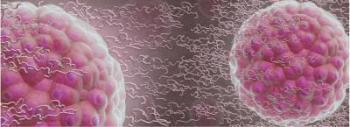Feb 11 2016
Stem cells are pluripotent, meaning they are capable of becoming any cell type. They have potential to be treatments for diseases such as leukemia, diabetes, and age-related blindness. The challenge is to be able to sustain this versatility until it is needed.
 Using a hydrogel that mimics the mucus around embryos in diapause, researchers are able to prevent stem cells and human embryos from differentiating. (Photo credit - Richard Weightman and Irene Canton)
Using a hydrogel that mimics the mucus around embryos in diapause, researchers are able to prevent stem cells and human embryos from differentiating. (Photo credit - Richard Weightman and Irene Canton)
Researchers have revealed in the recent issue of the ACS Central Science journal that imitating a natural method, known as diapause, could halt stem cells and effectively keep them in a dormant state for up to two weeks.
In another research, scientists illustrated that growing pluripotent stem cells (PSCs) on a variety of surfaces can make them differentiate into particular cell types. Based on these findings, a team of researchers, Steve Armes, Irene Canton, Harry Moore, Nick Warren and colleagues, hypothesized that the ideal kind of environment could stop them from differentiating completely.
Their inspiration came from mammals such as kangaroos, as they can select to delay gestation via a method referred to as embryonic diapause. These mammals use this method to ensure that their babies are born when the environment is highly favorable. Embryos displaying diapause are coated in a soft protective layer of mucus, so the team worked to create very soft hydrogels made from synthetic polymer, which had the capacity to imitate this natural material.
The researchers then placed the pluripotent stem cells within the hydrogel, causing the cells to stop growing and differentiating when exposed to human body temperature. The gel becomes a liquid when cooled, allowing the stem cells to be easily removed whenever needed. When removed the cells become active, and begin to differentiate again within a day.
It is possible to use these hydrogels to store and transport stem cells easily and in a cost effective manner. The researchers also observed that human embryos seemed to enter diapause when placed within these hydrogels. This indicates that with the ideal physical environment, it may be possible to delay gestation. This has never been observed previously with regard to human embryos.